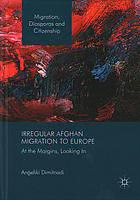
Irregular Afghan Migration to Europe : At the Margins, Looking In PDF
Preview Irregular Afghan Migration to Europe : At the Margins, Looking In
Migration, Diasporas and Citizenship Series Editors Robin Cohen Department of International Development University of Oxford Oxford, United Kingdom Zig Layton-Henry Department of Politics and International Studies University of Warwick Coventry, United Kingdom ö Editorial Board: Rainer Baub ck, European University Institute, Italy; fi James F. Holli eld, Southern Methodist University, USA; Daniele Joly, University of Warwick, UK; Jan Rath, University of Amsterdam, The Netherlands. The Migration, Diasporas and Citizenship series covers three important fi aspectsof the migration process: rstly, the determinants,dynamics and characteristics of international migration. Secondly, the continuing attachment of many contemporary migrants to their places of origin, fi ‘ ’ signi ed by the word diaspora, and thirdly the attempt, by contrast, to fi belongandgainacceptanceinplacesofsettlement,signi edbytheword ‘ ’ citizenship.Theseriespublishesworkthatshowsengagementwithand a lively appreciation of the wider social and political issues that are fl in uenced by international migration and encourages a comparative perspective. More information about this series at http://www.springer.com/series/14044 Angeliki Dimitriadi Irregular Afghan Migration to Europe At the Margins, Looking In AngelikiDimitriadi ELIAMEP Athens,Greece Migration,DiasporasandCitizenship ISBN978-3-319-52958-5 ISBN978-3-319-52959-2(eBook) DOI10.1007/978-3-319-52959-2 LibraryofCongressControlNumber:2017937306 ©TheEditor(s)(ifapplicable)andTheAuthor(s)2018 Thisworkissubjecttocopyright.AllrightsaresolelyandexclusivelylicensedbythePublisher,whether thewholeorpartofthematerialisconcerned,specificallytherightsoftranslation,reprinting,reuseof illustrations, recitation, broadcasting, reproduction on microfilms or in any other physical way, and transmission or information storage and retrieval, electronic adaptation, computer software, or by similarordissimilarmethodologynowknownorhereafterdeveloped. Theuseofgeneraldescriptivenames,registerednames,trademarks,servicemarks,etc.inthispublica- tiondoesnotimply,evenintheabsenceofaspecificstatement,thatsuchnamesareexemptfromthe relevantprotectivelawsandregulationsandthereforefreeforgeneraluse. Thepublisher,theauthorsandtheeditorsaresafetoassumethattheadviceandinformationinthis book are believed to be true and accurate at the date of publication. Neither the publisher nor the authorsortheeditorsgiveawarranty,expressorimplied,withrespecttothematerialcontainedherein orforanyerrorsoromissionsthatmayhavebeenmade.Thepublisherremainsneutralwithregardto jurisdictionalclaimsinpublishedmapsandinstitutionalaffiliations. Coverillustration©Suchota/AlamyStockPhoto Printedonacid-freepaper ThisPalgraveMacmillanimprintispublishedbySpringerNature TheregisteredcompanyisSpringerInternationalPublishingAG Theregisteredcompanyaddressis:Gewerbestrasse11,6330Cham,Switzerland To those who made it. Acknowledgements fi The research draws from several years of eldwork, three of which were “ made possible thanks to the IRMA Project: Governing Irregular ” Migration: States, Actors and Intermediaries , led by Professor Anna Triandafyllidou and funded by the General Secretariat for Science Research and Technology (GSRT, Greece). The IRMA project enabled me to undertake my post-doctoral fellowship on Afghan migration to fi Greece. I am thankful to GSRT for the nancial support and to the HellenicFoundationforEuropeanandForeignPolicy(ELIAMEP)that hosted the project and has been my intellectual home to this day. The postdoctoral fellowship would not have been possible without the initiative and support of my mentor and friend, Professor Anna Triandafyllidou, to whom I am grateful for the opportunity, collabora- tion and friendship. Ideas, thoughts and topics of this book have been presented in ff di erent formats and discussed in various workshops and conferences across Europe over the past years and I am appreciative of all comments received. ThewritingofpartsofthisbooktookplacebetweenAthensandBerlin, whereIspentasixmonthbetween2015and2016onavisitingfellowship at the European Council on Foreign Relations (ECFR). Amidst the “ ” ff refugee crisis , the fellowship o ered a rare opportunity to see another ff setting, a di erent country also on the receiving end of Afghan migrants. vii viii Acknowledgements ff I would like to thank ECFR Berlin for the opportunity o ered and the Mercator Stiftung for funding the fellowship. I am thankful to the all the institutions, and individuals that sup- ported me in their own way. I am particularly thankful to all the public ffi ffi o cials, NGO representatives, law enforcement o cials and volunteers forsettingasidetimeandsharingtheirknowledgeandinsightswithme. Theircontributionwasinvaluableandtheyassistedmeinunderstanding the political framework and practices in place, in Greece but also at an EU level. I am grateful to Palgrave and the editing team for the willingness to bringtothisbooktolife,theguidanceandgoodcollaborationalongthe way. – – Thebookwould quiteliterally nothavebeenmadepossiblewithout fl ffi the un agging support and encouragement of my parents, E e and Yannis. Lastly, I am forever indebted to all those who were willing to share their journey, hardships, aspirations and dreams of the future. Their fi strength was an inspiration. My only wish is they nd the hospitable places they seek. ’ Author s Note ff This book is based on two di erent source material. On the one hand, 110 interviews drawing from personal research – conducted during the period 2010 2012 in Greece, as well as again from September 2015 until June 2016 in Greece and Germany. A total of seventy (70) interviews with Afghan migrants have taken place over both time periods, including roughly forty (40) interviews with policy ffi makers, NGO workers and o cials. Secondly, it draws from empirical research undertaken during my fi fi postdoctoral research fellowship of fty ve interviews (55), in the IRMA Project (Governing Irregular Migration: States, Actors and Intermediaries), led by Professor Anna Triandafyllidou, funded by the General Secretariat for Science Research and Technology (GSRT, Greece) and implemented at the Hellenic Foundation for European and Foreign Policy (ELIAMEP). Interview sites throughout the years included Athens, Thessaloniki, Patras, Paros, Lesvos as well as detention facilities in the region of Evros – during the period 2010 2012, Istanbul and the detention facility of – Amygdaleza (Attiki region) between 2013 2014. Brussels, Berlin and – Athens once more, were added in the past 2 years (2015 2016). Quotes are used verbatim throughout the book, and where needed, thelocationoftheinterviewisgivenalso,toassistthereader.Settingsare importantintheanalysisandunderstanding,whichiswhywherepossible ix x Author’sNote fi extensivepersonalnotesfrom eldvisitshavebeenincludedinpaintinga “ picture of detention sites and reception places. Interviews under con- ” trolled conditions were coloured inevitably by both mine as well as the ’ interviewees experienceofthosesites.Accesswasalwaysgrantedfromthe appropriateauthoritiesandallinterviewsin detentionfacilitiestook place ff in separate areas, guaranteeing privacy. All participants o ered verbal consent. Most interviews took place with the presence of an interpreter either in English and/or Greek. Roughly 85% of the sample was men, between the ages of 20 and 38, which is representative of the Afghan population in Greece. Where names of interviewees are used, they have been changed to protect their identity and no personal information has been used that ffi could identify the persons. Law enforcement o cials, NGO representa- tives are also referred to by position rather than name, to ensure their anonymity per their request. Explanatory references have been relegated to endnotes, along with links to relevant websites and media articles.
